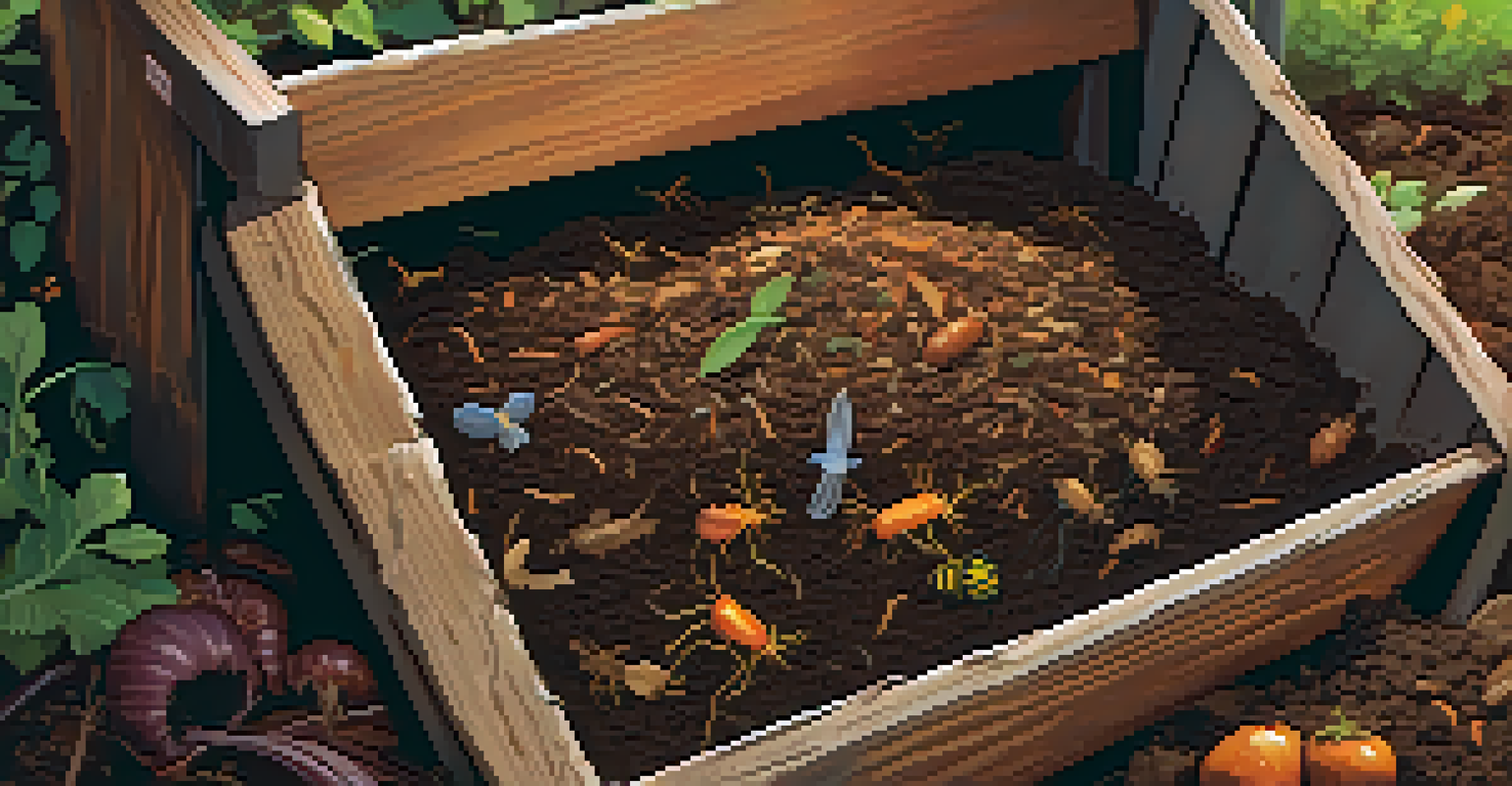Understanding Organic Gardening: Key Principles and Practices

What is Organic Gardening and Why It Matters
Organic gardening focuses on growing plants without synthetic fertilizers or pesticides. Instead, it relies on natural methods to promote soil health and plant growth. This approach not only benefits the plants but also supports the surrounding ecosystem, fostering biodiversity.
To forget how to dig the earth and to tend the soil is to forget ourselves.
By avoiding synthetic chemicals, organic gardening helps protect the environment. It reduces water pollution and promotes healthier soil, which can support a variety of organisms. This holistic method encourages a balanced ecosystem, ultimately benefiting both plants and wildlife.
Moreover, organic gardening offers a way to grow food that’s free from harmful chemicals. Many people choose organic produce for its perceived health benefits and superior flavor. This growing interest in organic gardening reflects a broader commitment to sustainability and environmental stewardship.
Key Principles of Organic Gardening
At the heart of organic gardening are a few essential principles that guide practices. These include maintaining soil health, promoting biodiversity, and using natural pest management techniques. By adhering to these principles, gardeners can create a thriving ecosystem that supports plant health.

Soil health is crucial; healthy soil provides nutrients and encourages beneficial microorganisms. Techniques like composting and crop rotation help maintain soil fertility and structure. This emphasis on soil management is what differentiates organic gardening from conventional methods.
Benefits of Organic Gardening
Organic gardening promotes environmental health by avoiding synthetic chemicals and fostering biodiversity.
Biodiversity plays a vital role in organic gardening as well. By planting a variety of species, gardeners can attract beneficial insects and pollinators. This natural balance aids in pest control and enhances the resilience of the garden against diseases.
Soil Health: The Foundation of Organic Gardening
Healthy soil is the cornerstone of successful organic gardening. It’s not just about the nutrients present; it’s also about soil structure and the microbial community. When soil is rich in organic matter, it can better retain moisture and nutrients, leading to healthy plant growth.
The greatest threat to our planet is the belief that someone else will save it.
To improve soil health, gardeners often incorporate compost, which adds essential nutrients and enhances soil structure. This practice not only enriches the soil but also promotes biodiversity by supporting a range of organisms that contribute to soil health. Think of compost as nature’s recycling program!
Additionally, practices like cover cropping and mulching help prevent erosion and suppress weeds. By nurturing the soil, gardeners create a robust environment where plants can thrive, leading to a more productive and sustainable garden.
Natural Pest Management in Organic Gardening
Managing pests organically doesn’t mean letting them run wild; it’s about finding balance. Organic gardeners use a variety of methods to deter pests, such as introducing beneficial insects like ladybugs or using traps. This approach minimizes harm to the ecosystem while effectively managing pest populations.
Another popular method is companion planting, where certain plants are grown together to deter pests naturally. For example, marigolds are known to repel nematodes and other harmful insects. This practice not only helps control pests but also enhances the overall beauty of the garden.
Soil Health is Crucial
Maintaining healthy soil through composting and natural methods is essential for thriving plants in organic gardening.
Additionally, techniques such as crop rotation and maintaining healthy soil can reduce pest problems. By promoting a diverse environment, organic gardeners can create a self-regulating system that keeps pests in check without relying on harsh chemicals.
The Role of Biodiversity in Organic Gardening
Biodiversity is a key component of organic gardening and offers numerous benefits. A diverse garden can attract beneficial insects and pollinators that help with plant growth and pest control. This natural approach leads to a more resilient garden capable of withstanding diseases and pests.
Planting a variety of species also encourages a balanced ecosystem. For example, flowering plants can provide nectar for pollinators, while others may attract predatory insects that feed on pests. By fostering this balance, gardeners can reduce the need for external interventions.
Moreover, biodiversity can enhance soil health and fertility. Different plants contribute unique nutrients to the soil, and their varied root structures can improve soil aeration and moisture retention. Ultimately, a diverse garden is not just more beautiful; it’s healthier and more productive.
Implementing Organic Gardening Practices
Starting an organic garden may seem daunting, but it can be simplified into manageable steps. Begin by assessing your site and choosing the right plants for your climate and soil conditions. Selecting native plants can also promote local biodiversity and require less maintenance.
Once your garden is established, focus on soil health through practices like composting and mulching. These methods enhance fertility and protect your plants from temperature extremes. Remember, nurturing your soil is a continual process that pays off with healthier plants.
Biodiversity Enhances Resilience
A diverse garden attracts beneficial insects and improves soil health, leading to a more resilient and productive ecosystem.
Lastly, be patient and observe your garden. Organic gardening is about working with nature, which takes time. By paying attention to your garden’s unique ecosystem, you can adjust your practices and grow a vibrant, thriving organic space.
Challenges and Rewards of Organic Gardening
Like any gardening approach, organic gardening comes with its own set of challenges. Pest management can be trickier without synthetic chemicals, and maintaining soil health requires ongoing effort. However, these challenges often lead to a deeper understanding of the ecosystem.
On the flip side, the rewards of organic gardening are plentiful. Not only do you get to enjoy fresh, chemical-free produce, but you also contribute to a healthier planet. Many gardeners find joy in the process itself, watching their plants grow and thrive naturally.

Additionally, organic gardening fosters a sense of community among like-minded individuals. Sharing tips, experiences, and even produce with neighbors can create a supportive network. The sense of accomplishment that comes from growing your own food organically is truly unparalleled.